 |
 |
|
Welcome to the World – Gentle Horse Birthing and Non-Invasive Imprinting.
By Liz Mitten Ryan
De-sensitization and imprinting are found in every horse trainer’s tool box.
Their importance to our efficient handling of horses is invaluable. From a human perspective our interaction with horses,
from handling to riding is safer and less stressful. Its value to a trusting partnership though is dependent on how sensitive and
considerate we are to the horse. Is our horse enjoying the relationship more as a result, or are they simply dead to the stimulus?
My journey with horses has been an adventure of discovery. I am always looking to refine and enhance the connection and
communication. As a warmblood breeder I have birthed and raised dozens of foals. I remember reading all I could get my
hands on, and specifically when Dr. Robert Miller published his findings on imprinting to the snickers of the ‘old boys’ club.
His practices are now embraced by Natural Horsemanship greats like Pat Parelli and adhered to religiously by most breeders.
I have been a breeder now for twenty years and have developed, through the process a more holistic and rewarding
approach, similar to how we welcome humans into the world. There are several important ideas involved:
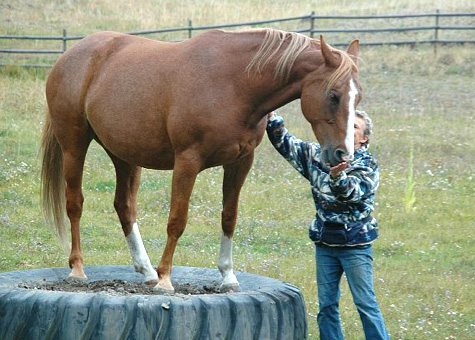 |
BECOME A TRUSTED AND CONSIDERATE FRIEND TO YOUR MARE.
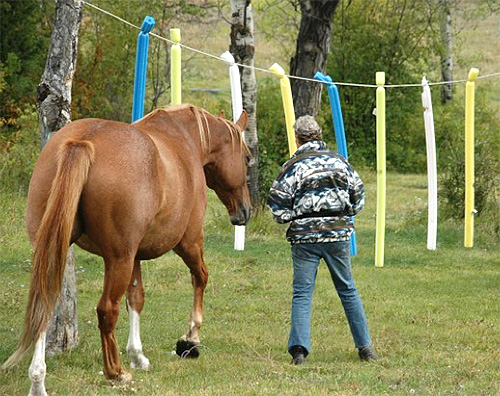 |
In order for my mare to welcome me at the birth, she must first consider me a friend to be trusted with her well-being. This
is a lifelong process, but a simple lead in is to genuinely consider her; to be kind and generous as we would be to a human
friend. One of the best ways to a mare’s heart is through her stomach and making a fuss over her condition by preparing
wholesome healthy meals and snacks. This will have her nickering the minute she sees you. Grooming, scratching and forays to find choice patches of succulent grass are also great bonding exercises.
All of this will be time well spent as she will transfer her feelings about you to the new foal. Animals learn by example, and
the foal will watch his mother closely to see how she responds to her human caregiver.
LEARN ALL YOU CAN ABOUT FOALING SO YOU CAN MAKE WISE SAFETY
DECISIONS.
There are many good books available on the care of the mare and foal throughout the birthing period. Study them and get
up to speed on when ‘all is normal’ and when to call a vet. Many breeders tell the sad story of finding their mare and foal
dead in the morning – not a very pretty situation. Others, not knowing what to watch for, leave a mare laboring for hours in
agony and possibly lose her and the foal. Horses birth quickly and efficiently unless there is a misalignment, and it is important to know what to watch for.
HELP MAKE YOUR MARE’S BIRTHING EXPERIENCE WONDERFUL.
In keeping with the relationship you have fostered with your mare, be there when she is birthing and help make it easier for
her. Because my mare knows her well-being is everything to me, she welcomes me at the birth. When the water breaks and
the sack appears, I immediately check the position of the foal. In a normal birth one foot is presented slightly ahead of the other, soles down. If it is any other way, make an emergency call to your vet!
Holding the foal’s front pasterns and pulling with the mare’s contractions will help her labor proceed more easily, and when
the nose appears, break the sack so the baby can breathe. If all goes smoothly birth usually occurs about twenty to thirty minutes after the water breaks.
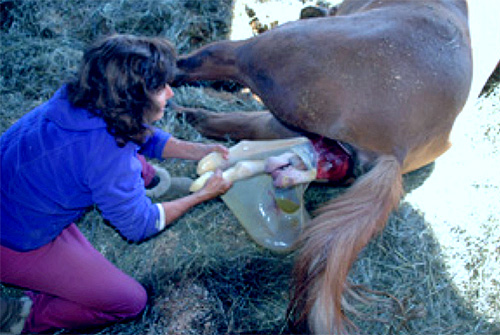 |
BE SENTISIVE AND GENTLE.
Imprinting can be loving and helpful, rather than disruptive and invasive. Harsh imprinting methods advise taking the baby
away from its mother at birth and performing a series of extreme desensitizing exercises which are designed to deaden the
foals reaction to simple procedures like trimming and shoeing by tapping the soles of its feet hundreds of times, or Veterinary
treatment by sticking fingers in all of its orifices. Electric clippers, plastic bags; the list goes on and on.
All of this forms the baby’s first impression of the world while its mother is restrained and not allowed to welcome her own baby.
In my barn the foal is towel dried and loved, between my kissing and congratulating the mare until it breaks the umbilical
cord. I then help it to get close to the still recovering mom so she can lick all the places I have just dried, and the two of us
alternate in one big welcome fest. The mare then rises and I clip her placenta back up to itself so she won’t step on the
trailing end and tear it (squeeze clamps from the hardware store work well). It is the weight of the placenta that helps it
separate cleanly from the uterine wall without leaving bits that can cause serious infection.
All the while the baby is attempting to stand and when he succeeds, will then begin his search for his mother’s udder. It is
better to give him time (up to two hours) to find it on his own and most mares will try to help by getting in position and
pushing the foal in the right direction. My lead mare L.E. is a master at this, curving her body around the foal and pushing his hind end with her nose.
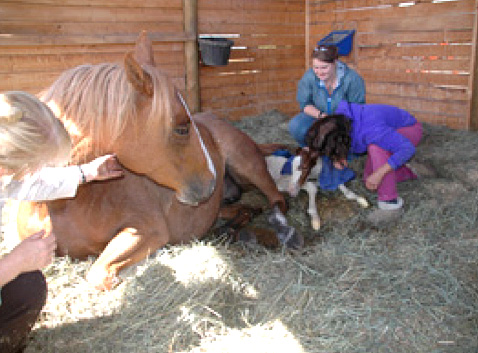 |
DON’T DOMINATE THE FOAL, FORCING HIM TO COMPLY IF HE’S A BIT
RESERVED.
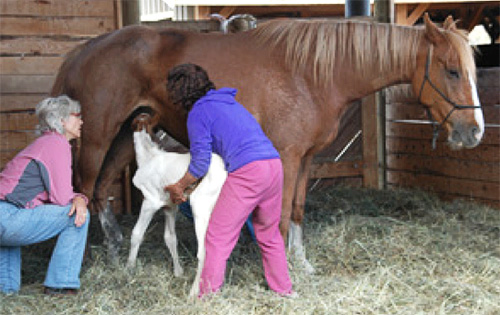 |
Take the time it takes (as Pat Parelli says) to gently and considerately get to know the foal and convince him that your
concern is for his comfort and safety. Talk gently, praise him and don’t be in a hurry to restrain him. The proof is in the
pudding. Paschar, the foal in these photos, was born 3 weeks early after Epona, his mom, had a serious bout of pneumonia.
The vets suggested we abort the ten month old fetus as she was having trouble breathing.
That was one thing Epona and I agreed upon –our baby would live! When Paschar was born three weeks early, he was
literally fighting for his life and even after my gentle welcome, a day later he tried to rear and run at me. I understood his
concern. Humans had tried to end his life and he had to fight for it. Patiently I talked to him and told him he was my angel
(Paschar is the Angel of Vision) and as I talked and stroked him, his eye would soften and he would relax. Days became
weeks and I would remind him who he was and how loved he was and each time his eye grew softer. By the time he was
two months old he was the most gregarious, loving and affectionate foal who particularly loved being buried under hugging
children. At three months old he followed at liberty, backed, moved his hind end and shoulder, picked up his feet, trailer
loaded (all at liberty) and ran happily behind in a game I call ‘Stick (to me)’. He was fully imprinted and de-sensitized while fully alive and filled with Joy.
By two years old, he understood my every word and was so self-assured that he followed me down to our playground
several hundred yards from the paddock where his family was grazing, got up on tires, ran across bridges, walked ,trotted, and Whoaed all by voice and body language, all without halters, ropes or sticks.
Paschar is a super horse. Why? He was born gently, loved, treated with patience and consideration and knows that his well –being is my first concern.
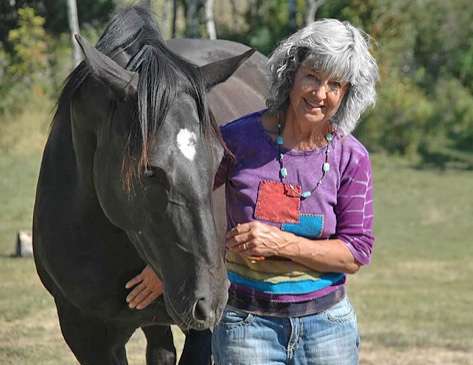 |
LIZ MITTEN RYAN AND EQUINISITY RETREATS
Liz Mitten Ryan is an accomplished artist, award-winning author, horse trainer and animal communicator. She is the
facilitator of Equinisity Retreats a 320-acre retreat center in the grasslands of British Columbia. People from all over the
globe come to interact with her one family herd of warmblood horses. Liz’s film ‘Herd’ and five books are showcased on the Horse Lifestyle website. equinisityretreats.com
|
 |
 |
|
To advertise your horse product or service, Contact Ann
|
 |
 |
|
InfoHorse.com, Horse Information Lives Here ® 4/19/2024
Contact Us to Advertise to over a million Horse Owners.
All images and content Copyright© 2017 by InfoHorse.com, Equusite.com.
Horse Owners are Dog Owners; Dog Product Information dognowner.com
|
 |
 |
|
Articles, Academic Schools, Arena Maintenance, Animal Communicators, Barns, Barn and Accessories, Barn Equipment and Tractors, Breast Collars, Grooming Products for Horses, Hay Feeders, Horse Blankets, Horse Books, Horse Videos, Horse Breeders, Horse Camping Gear, Career Schools, Carts and Buggies, Horse Training Clinicians, Equestrian Clothing, Dogs and Puppies, Horse Fencing, Western Art & Furniture, Horse Property for Sale, Horse Products For Sale, Fly Control, Foal Care, Horse Footings, Horse Gifts, Horse Health and Nutrition, Hoof and Leg, Horse Insurance, John Lyons Certified Trainers, Equine Lawyers, Leather Care, Links, Horse Property, Horse Photography, Portable Horse Stalls, Arenas and Roundpens, Horse Riding Schools, Horse Schools, Safety Products, Services for Horses, Horse Trailers, Horse Shipping, Horse Skin Coat Care, Horse Software, Specialty Trainers, Horse Summer Camps, Tack, Horse Trainers, Treats and Snacks, Truck Accessories, Trucks, Horse Vacations, Western Lifestyle, jewelry PCC G+
|
|